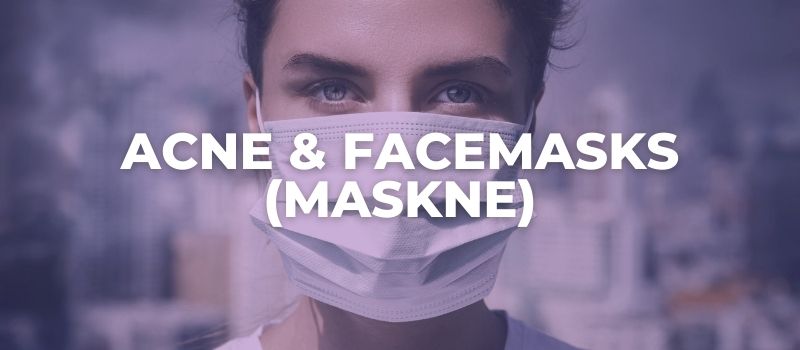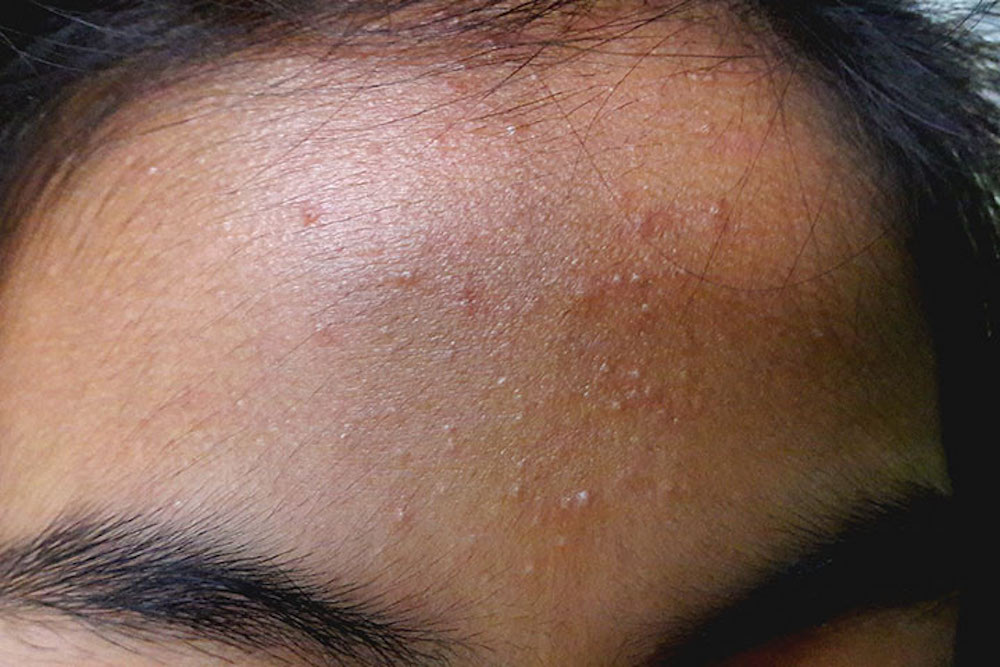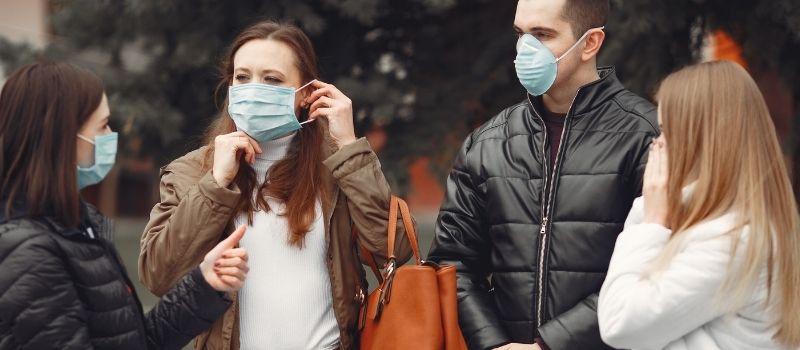Strapping a piece of cloth to our faces isn’t exactly ideal for our skin and the problem is only made worse by scorching summer heat and excessive sweating.
It’s so bad, in fact, it lead to a whole new issue many of us were unfamiliar with before – maskne.
Yes, face masks cause acne, but fortunately, there are many simple steps you can follow and plenty of treatments available to approach this particular concern.
But let’s start by calling maskne by its true name, acne mechanica!

What Is Acne Mechanica?
Acne mechanica is a specific form of acne that is triggered when the skin is under pressure or being rubbed against clothing or tight protective gear.
It is defined as being an acne eruption in areas of friction, pressure, stretching, constant rubbing, and pinching, and it is compounded by moisture trapped underneath the fabric which gets worse with humidity, heat, and exercise.

Acne mechanica presents itself as angry and inflamed pustules that usually pop up on the back, shoulders, chest, thighs, and forehead.
It can appear regardless of pre-existing acne problems, and may even appear if you are amongst the small number of lucky individuals who have never dealt with acne breakouts in their lives.
Will Spraying Salicylic Acid On Your Mask Help Prevent Acne?
Salicylic acid is an amazing ingredient that works to clear out the pores, soothe breakouts, and prevent new pimples from forming, however…
Spraying salicylic acid on your mask won’t help prevent acne and can potentially exacerbate your problem.
First, don’t forget that salicylic acid does have side effects and most of the time this is described as mild to severe irritation, depending on your skin sensitivity.
So, right off the bat…
Spraying your mask with salicylic acid will cause your skin to heat up due to sweat and humidity and this may result in irritation.
Furthermore, if you are wearing glasses, you are probably familiar with how annoying it is when they become foggy because you’re breathing in the mask and sending hot air up towards your eyes.
Now imagine a mask that has salicylic acid sprayed on it. This will most certainly cause eye irritation.
And lastly and most importantly, there is the risk that this trend will make people who are not familiar with the effects of salicylic acid see it as a few-times-a-day thing in desperation to get rid of their issue.
Therefore, telling people that they can spray salicylic acid on their mask truly opens the door to potentially severe consequences from abusing this advice.
10 Ways To Treat & Prevent Mask Acne (Maskne)

Here are 10 helpful tips on how to treat and prevent acne caused by masks:
Change your mask more often than once a day if possible
Since it seems like the COVID restrictions aren’t going anywhere anytime soon, the best idea is to buy several face masks and change them twice or three times a day if possible.
This is especially a good idea if you are working long shifts in a hot and humid place as having a dry and fresh mask on will help improve acne.
Wash your mask every day
This is especially important if you are dealing with a case of acne mechanica in the areas where the mask is.
You want to have a fresh, clean, and dry mask on at all times because the only thing that causes acne mechanica is excess moisture and friction.
Another useful tip is to not use a softener when washing your masks because residues always remain on the fabric and it is also something that can cause irritation to the skin.
Take breaks and blot excess moisture away
This is a wild time we live in, therefore, it is important that you take all the necessary steps to protect yourself the best you can.
Don’t be afraid to ask for more frequent breaks just to be able to move aside, catch a breather, blot excess moisture away, and change your mask.
This doesn’t take longer than 5 minutes and it is important that you keep both your physical and mental health in the best condition.
Cleanse your face after removing the mask
Always wash or rinse your face after removing the mask. Be careful not to over-cleanse and avoid using harsh cleansers more than twice a day.
However, rinsing with warm water is totally fine and beneficial, and you can do it after removing your mask.
Treat the area with targeted ingredients
Mask acne is annoying, and you may be especially scared if you’ve never dealt with acne before. But there are over-the-counter options that can help you improve the issue.
- Salicylic acid – this powerful ingredient sits at the heart of the solution against the acne battle. Besides being gentle on your skin, it is an excellent chemical exfoliant which can penetrate deep into the pores and clear them out of excess acne-causing stuff like excess oil and dead skin cells.
- Benzoyl peroxide – if your acne is leaning towards moderate to severe, this treatment can help reduce and eliminate the overgrowth of acne-causing bacteria in your pores by infusing them with oxygen. It is the best over-the-counter treatment for more severe acne.
On the other hand, if you are all too familiar with acne and are already using these ingredients, don’t increase the number of times you usually apply them just because of your most recent concern.
Bear in mind that both salicylic acid and benzoyl peroxide are very effective when it comes to acne, however, should you use them way too often, they can have some side effects on your skin.
For one, salicylic acid may cause redness, irritation, and even peeling if used too often and benzoyl peroxide is notorious for being able to severely dry out the skin.
Try to understand that although all you want is for your acne to be gone, you need to be patient and address the issue properly for your own benefit.
Use salicylic acid and/or benzoyl peroxide no more than twice to three times a week for great results!
Don’t stress over it too much
Stress is a common factor that indirectly contributes to acne, therefore, as I already mentioned before – it is important to keep your mental health in the best condition possible.
As annoying as it possibly sounds, try not to stress over it too much because paying too much negative attention to it will only make the problem bigger in your eyes.
This is a good time to use less makeup
If you are a makeup user, this is a good time to ditch heavy primers, foundations, and powders on top.
Try to use the bare minimum if you really must, or simply apply makeup on the upper area of the face.
Sweating under the mask can soften the pores and allow clogging makeup ingredients to penetrate deeper and cause more severe issues like cystic acne.
If your job demands you to wear makeup, try to communicate with your employer and bring out your concerns in the most polite manner.
Reviewing healthy options together can help you come to an agreement. Don’t be afraid to want the best for your health.
If your skin isn’t too dry, don’t moisturize excessively
Wearing a piece of cloth over half of your face is definitely the time where you shouldn’t do anything excessively cosmetics-wise.
Try to listen to your skin and adjust to its needs. If you live in a warmer and more humid climate and your skin is leaning towards the oily side, you don’t need to moisturize excessively with heavy creams during the time you wear a face mask.
If, on the other hand, your skin is on the dry side and you think you can handle it – feel free to moisturize all the way.
What’s most important is to not ignore your skin’s needs and always adapt your skincare routine according to it.
Use sunscreen only
Instead of moisturizing excessively, opt for only using sun protection in the mornings. If you are directly exposed to the sun while wearing a mask, perhaps investing in sunscreen that comes in a spray bottle will be most beneficial for you.
Look for professional help if the problem becomes unbearable for you
Online advice can be helpful in pointing you towards the most beneficial treatment, however, it can never offer an individualized treatment plan and support.
Therefore, if your issue is affecting you negatively, it is always a good idea to look for professional help.
Seeing an esthetician if you cannot afford a dermatologist will also be beneficial, however, if you are more comfortable being examined by a doctor, this is certainly the best thing that you can do.
A dermatologist will be able to personally examine the severity of your issue and come up with a skincare routine or a course of antibiotics that can help you in a short amount of time.

My name is Simone and I am a certified skin specialist. I created this website to teach my readers how to take great care of their skin and I also like to occasionally share my honest opinions on skincare products I’ve tried. You can learn more about me here.
